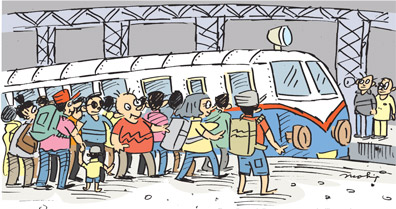|

by R. S. Karunaratne
Active and passive voice
When we change a sentence from the active voice to the passive voice,
we have to remember the following points:
|

The railway station was crammed with people. |
* The tense of the verb is not changed
* The verb has to agree with the subject
* If there is no object in the sentence, we cannot change it to the
passive voice
Examples
Active voice: The baker delivers bread to my restaurant every day.
(Simple present tense)
Passive voice: Bread is delivered by the baker to my restaurant every
day.
Active voice: The teacher took the students to the museum. (Past tense)
Passive voice: The students were taken to the museum by the teacher.
Active voice : She will cook the vegetables before the visitors come.
(Future tense)
Passive voice: The vegetables will be cooked by her before the visitors
come.
Active voice: Jackson is building a wall. (Present continuous tense)
Passive voice: A wall is being built by Jackson.
Active voice: Srima was baking a cake. (Past continuous tense)
Passive voice: A cake was being baked by Srima.
When we use vague nouns and pronouns in the active voice, they are
omitted in the passive voice.
Active voice: Some burglars broke into our house last night.
Passive voice: Our house was broken into last night.
Active voice: They built the house with bricks and cement.
Passive voice: The house was built with bricks and cement.
When you change a phrasal verb from the active voice to the passive
voice, take care not to omit the adverb or preposition that is part of
it.
|

The wedding car was decorated with ribbons and flowers. |
Active voice: We tied up the books into bundles.
Passive voice: The books were tied up into bundles.
We use 'with' instead of 'by' in the passive voice when the verb
refers to a state of things or when we refer to an instrument used by
somebody.
Don't say: The park was crowded by spectators.
Say: The park was crowded with spectators.
Some more examples:
The railway station was crammed with people.
The shopping mall was crowded with shoppers.
The wedding car was decorated with ribbons and flowers.
The tank was filled with water.
The town was thronged with tourists.
My mailbox was flooded with junk e-mail.
We use 'supposed to' when we refer to an action or event which is
expected to happen.
The principal is supposed to come at 9.30 a.m.
She is supposed to leave for Geneva tonight.
Word Game
Here is an interesting word game. In column A we give a list of Greek
word parts with their meanings.
Fill column B with the relevant English words. The first one has been
done for you.
Check your answers with the key.
Column A Column B
1. acro (tip) acronym
2. an (no) .................
3. anti (against) ................
4. aristo (best) .................
5. astro (star) .................
6. atmo (vapour) ..................
7. auto (self) .................
8. baro (weight) ..................
9. biblio (book) ..................
10. bio (life) .................
11. cata (down) ..................
12. chrono (time) ................
13. cracy (rule) .................
14. crat (rule) ..................
15. demo (people) .................
16. dia (through) .................
17. eco (house) .................
18. geo (earth) ................
19. graph (write) ................
20. hemi (half) ................
21. homo (same) ...............
22. logy (study) ..............
23. logue (speak) ..............
24. mega (great) ...............
25. meteor ...............
Key:
2.anonymous 3. antonym 4. aristocrat 5. astronomy 6.atmosphere 7.
autograph 8. barometer 9.bibliography 10.biography 11. catalogue
12.chronometer 13. autocracy 14. autocrat 15. democracy 16. diagram 17.
ecology 18.geography 19.graphology 20.hemisphere 21.homonym 22. geology
23. dialogue 24.megaphone 25.meteorology
Starters:
Use of prepositions
[Part 11]
Most beginners find it difficult to use prepositions correctly. Here
is a simple guide to use prepositions meaningfully.
Beneath
If something is beneath something else, it is directly between it and
the ground.
There is a plug point beneath the table.
Mother placed a pillow beneath the child's head.
We shivered beneath our blankets.
|

Mother placed a pillow beneath the child’s head. |
Sometimes we talk about things beneath the surface.
Beneath his tough exterior there was so much of kindness and sympathy.
When somebody or something is beneath you, they are below your rank or
not suitable for you.
Now that you are a multi-millionaire hard work is beneath you.
It was beneath my dignity to haggle over the price.
Prince Saliya married someone beneath him.
Beyond
If something is beyond a place, it is on the other side of it.
There were tall trees beyond the house.
We managed to stay beyond the gunfire.
The police station is one kilometre beyond the library.
If something happens beyond a particular time, it happens after that
time.
Some students remain in the school beyond the age of 17.
We use 'beyond' to introduce an exception to what we say.
Parents can do nothing beyond warning their children.
He does not know anything beyond what he reads in newspapers.
Beyond a cursory glance, he had never spoken to me.
Sometimes, things go beyond a particular point or stage.
University ragging has gone beyond the point of control.
Certain things are beyond belief or comprehension.
The total number of insects in the world is beyond calculation.
After an illness some people change beyond recognition.
If something is beyond you, you cannot do it.
Giving you a promotion is beyond me because I have no authority.
Understanding the concept of Nirvana is beyond the capacity of ordinary
people.
Luxury items are beyond my resources.
Certain happenings are beyond our control.
By
If something is done by somebody or something, they do it.
My case was handled by a senior criminal lawyer.
The meal was served by a young waiter.
The boy was bitten by a ferocious dog.
The decision to display warning signs against smoking was taken by the
government.
The beautiful painting was done by a relatively unknown artist.
Macbeth was written by William Shakespeare.
Have you read any book by John Fisher?
We do certain things by a particular means.
Do you come by bus?
I saw a fleet of cars being loaded on to a ship by crane.
Forming adjectives from nouns
Words often come in families. We can expand our vocabulary by
becoming familiar with these word families. An enriched vocabulary will
help us to speak and write English fluently. In the following quiz we
give a list of nouns in column A. Write the relevant adjective in column
B. The first one has been done for you. Check your answers with the key.
Column A Column B
1. Death dead
2. Deception ..............
3. Decision ..............
4. Decoration ..............
5. Depth ..............
6. Defeat ..............
7. Defence ..............
8. Definition ..............
9. Demand ..............
10. Democracy ..............
11. Demonstration ..............
12. Denial ..............
13. Dependence ..............
14. Description ..............
15. Desire ..............
16. Destruction ..............
17. Determination ..............
18. Development ..............
19. Difference ..............
20. Direction ..............
21. Disagreement ..............
22. Disappointment ..............
23. Disaster ..............
24. Discipline ..............
25. Distance ..............
Key:
2. deceptive 3. decisive 4. decorative 5. deep 6. defeatist 7.
defenceless 8. definite 9. demanding 10. democratic 11. demonstrable 12.
undeniable 13. dependable 14. descriptive 15. desirable 16. destructive
17. determined 18. developed 19. different 20.direct 21. disagreeable
22. disappointed 23. disastrous 24. disciplinary 25. distant |


